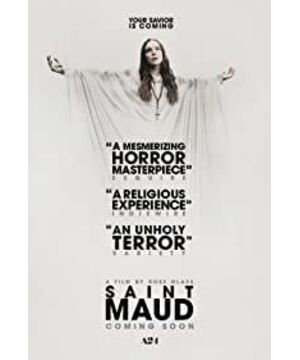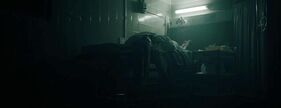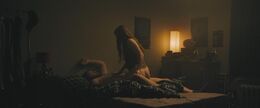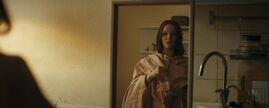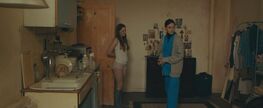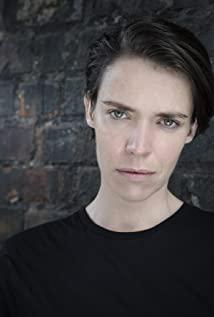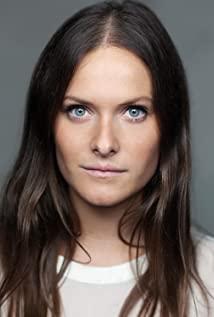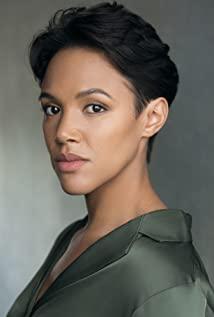——Completely spoiler warning——
I like to watch the interviews of creative directors very much. For a film that is still unfinished, the director interview is the after-party of the transition!
This interview from VULTURE can be said to be the most detailed interview about "Sage Mord". The angle is comprehensive, the details are rich, and the time is relatively new. You can see the process before and after the creation of this work by the director Rose Glass, and you can feel it in words. She has a very cute personality:) So I translated this article and shared it with everyone.
It mentioned a lot of content, some of which I could trace back when I watched the film, and some details were quite unexpected. For example, regarding the nails in the shoes, I originally thought it came from religious asceticism (with physical pain). Get the experience of divinity), in fact, the more direct reference is BDSM! (which is even more cuter:) also talked about the design of the heterochromatic pupil, the design of the face deformation, the identity of the two female characters and the erotic tension between them, the relationship between the director and religion, and the final outcome的处理。 Treatment.
As the first feature-length work, Rose Glass’s creative ability and director skills are very surprising. I think this is a feminist horror tale with many entry points worthy of more taste, and there are many outstanding films in common. I hope this interview can bring a richer experience and understanding to friends who like this work.
——Completely spoiler warning——
"Saint Maud" director Rose Glass explains what's Real and What's Imagined in Her Unholy Horror Debut Saint Maud's Rose Glass Explains What's Real and What's Imagined in Her Unholy Horror Debut
Interviewer: Rachel Handler // Translation: _Dysmg_ // The original text is posted on vulture.com, 2021.01.29. The copyright of this translation is reserved by the translator. Reprinting and use require permission
When did you first imagine "Sage Mord"?
In 2014, when I completed my master's degree at the National Film and Television School in the UK, I started to have this idea. A few years later, I started to write scripts. The original setting was about a love story between a young woman and the voice in her head. At the time, I was reading some stories about people with auditory hallucinations and various things that might cause this. I also want to make the kind of movie I like, the kind of very subjective movie. We all live in the same world, but we are all limited to our bodies, and we are all experiencing reality subjectively. You never know what other people are thinking.
How did it develop from this idea?
Constant anxiety, change and thinking. I quickly began to examine this initial premise, and I wanted to figure out what else happened in her life. There are a bunch of things in her mind that no one else knows, but why does no one know? So I thought that she was very lonely and alienated. There was no one in her life, which is why she has such an important relationship with the new patient she is taking care of. I began to realize that maybe her relationship with God could be integrated into her relationship with this woman. So the thought in her mind is that she is about to embark on a sacred mission to save this woman's soul.
I am also thinking about how when people hear the deeds of people who detonate themselves or set themselves on fire in the name of religion, how can they simply attribute those who did terrible things to that they are inherently bad or crazy-this is A lazy and dangerous way of thinking. Being guided to do something so extreme, this change cannot happen overnight. There will always be a long list of complex events. I try to make the audience understand this character, to understand why and how she got here.
I am surprised that this is your first movie. Its production is very stable, especially in terms of color. I think it has reached a very delicate balance. It feels like the work of someone who has completed many movies. What do you think this is because of?
fear. [Laughs] Fear of failure. And obsession. I was doing other things and other jobs before, but like I said, I have been thinking about this character and this movie since 2014. When we started filming, I didn't read my script at all. And I have a lot of great partners.
What was your short film work before "Sage Maude"?
I didn't start to create similar short films until I went to film school. But before that, when I was 11 or 12 years old, my parents gave me a camera, and I started making movies at home, trying things like stop motion animation. When I was a teenager, I took some silly imitations with a few cool friends. Even when I was working on those works, it was quite dramatic, silly, funny and dramatic. Later I went to film school and discovered art films. I think this is a strange combination of two instincts. I hope everything is fun and entertaining, but fun. The short films I made, narrative, tend to be isolated and claustrophobic characters to some extent, and their experience of reality is a bit different.
I read an interview about you and you said that "women like messy things." I think this is completely correct, especially I am a woman who likes messy things, although I do think that for a long time, it seems that horror movies are not suitable for women.
This answer is that I am responding to a male reporter who asked me how I "could" film these bloody scenes. I thought, "This is what I wrote!" He is a very good person, but he really seems to think that because I am a small woman, I will act like "Ah! Blood stabbing!" It's scary!" Someone told me that in general, the audience for horror movies is mostly women. There are too many strange and supernatural things about women and their bodies in history. Maybe we can advance this.
I can't believe men would ask you this kind of question.
Yes indeed. [Laughs] It's like... [sighs]. Well, anyway. The movie itself has a voyeuristic and subversive thing. Strangers sit together in a dark room and observe the lives of others, while there is another level of voyeurism in the "Sage Mord". People like to be shocked. Fear touched some very primitive things, making people experience crazy and dangerous things in a safe movie theater seat. I want it to be an interesting movie. I remember I once persuaded the staff of the development department: "Yes, I swear, this will never be a cold, depressing film!"
This is a big gain after seeing it for the first time-I think it's so fun. I remember I told you that after the screening, when you said "Thank you, I really want everyone to think it is an interesting film."
This is not a comedy, but life is interesting. Tragedy and comedy go hand in hand. The scene at the end usually has such an impact on the audience-first shocked sounds, then disturbed laughter. There is an instinctive reaction between fear and laughter. Morfydd has contributed a lot to this. There are a lot of jokes in the script, but most of it is because she is a really good comedian.
How did you find Morfydd?
It was during a very traditional audition process. We auditioned halfway through the script. We met a lot of people at the beginning, because the key to this movie is to find the right person. If you don't like her or that character, the whole movie will be a complete failure. Morfydd was one of the last people we met. It was the classic and clichéd plot, that is, "When we saw her audition, we knew it was her." What I want is that she appears in almost every scene of the movie. Here, it must be a convincing and charming person, a person who keeps your eyes on. She has a wide range of backgrounds and is a very good comedian. At the premiere of the London Film Festival, she also starred in two other films, and in one film she played two roles, but people did not recognize [every film is her]. She is really changeable.
Her eyes are so incredible, shocking, like liquid black holes. Did you make any changes to her eyes?
We asked her to wear a brown contact lens on one eye. Maude has heterochromatic pupils. I hope the audience can believe that she is a character who can be completely ignored in life and often overlooked; she is timid and plain. But I tried to come up with a subtle visual effect that would make her unusual and mixed. You can only tell in a few shots that her eyes are of different colors. I think some people even think that her eyes change throughout the movie. But when she had a godgasm, we opened her eyes wide.
Divine orgasm! How did you come up with this concept?
I wish I could come up with a name that sounds more elegant. [Laughs] I have been thinking hard since the beginning, how can I make the relationship between Maude and God more empathetic? Allow the audience to integrate into themselves? In the beginning, there were many voices of God in [the script], but it was a bit distracting. I want to find a different way of communication. The last thing I want is for God to become this kind of rational, academic thing—even if you don’t have faith, this kind of succumbing to ecstasy, bursting out of your body, connecting with something greater than yourself, this This concept can be felt by anyone. It makes her feel good. Unless she can get something pleasant and beautiful from her relationship with God, this movie won't work, and the rest of her life is small and boring.
In some research I have done, I read that some scholars now think that Joan of Arc may have temporal lobe epilepsy, accompanied by seizures, hallucinations, and this incredible happiness and bliss Euphoria. So now some people think she has this disease, and that's why this 13-year-old girl has the belief in leading the army. I'm not saying that Maude also has this disease, but some kind of ecstasy, orgasm, sexual pleasure, and religious intoxication-I have talked to some people and they said that you can enter this space through meditation and fear. No matter what happens in those scenes, she interprets it as God, but in fact this is the same brain area that you can reach through sex, hallucinogens, and meditation. As an unbeliever, this is how I can experience it.
How did you accomplish the facial stretching effects of Mod and Amanda in terms of effects and directors?
When Maude’s face stretched to her extreme, it was a kind of "facelift"-Technicolor produced this special effect, and in the end the work they did far exceeded what we initially paid for The part they do. All of this was done in the later stage, but I kind of hope that even in her most sacred, pure and ecstatic moments, there is a hint of dark power behind all of this. Jennifer [At the end] The face change is a combination of scary makeup and scary special effects. Before that moment, the relationship between Jennifer and Morfydd's roles was very serious, but when it came to that scene, Jennifer turned to me and said, "So...the devil?" I said, "Yes, that's very good." ,thanks."
We learned that there was some kind of traumatic event between Maude and one of her previous patients, but we don't know what happened, except for seeing an old man with blood all over his chest. What do you think about the extent to which you want to reveal what has happened?
I don't want it to look like, "A terrible thing happened, and it directly caused a person's madness." To me, it feels too much like a chicken and an egg. I want to give everyone a sufficient understanding of this matter, but I don't want the whole story to be about it. Her whole life feels alienated. She may have minor health problems, but her job in the hospital-this stressful life-and-death career-has exacerbated the problem. No social security system, it Will lead to some consequences.
So all these details are concretized in your mind, but not in the film?
I talked to a friend of a friend, a nurse, and said, "Oh, I'm making a movie with a nurse. Do you think these plots are true to you?" Then she said, "Yes, of course , These things in medicine, suffering from post-traumatic stress disorder at work, this is a very stressful profession." She told me such a story-she once worked in the intensive care unit, responsible for lung diseases The patient, working in the night shift, has an old man sleeping on one of the beds, and has undergone a major operation on his chest. A huge incision in the middle of his chest was sutured. He suffered a cardiac arrest. She called the emergency team. When the emergency team arrived, she began to perform chest compressions. Because the old man was so fragile and thin, the incision in his chest was split. The hand went straight into his chest, crushing everything. Everything splashed on her face, and he was so dead. Anyway, this matter has been haunting me, and I asked her if she could put this story in the movie, and she said yes.
Has this nurse friend watched the video?
Yes. She likes it very much. What we have shown in the film may be much milder than the actual situation. The medical scene in real life is quite shocking.
When you talk to Morfydd about creating Mord’s inner world, how clearly do you want to describe those things that only happened in her mind, or that there is some truth in what happened to her? Did you say that you want the audience to guess until the end?
Oh, exactly. Until the last shot, I think you can understand it as a real spiritual relationship she has established. My explanation is that at the end of the film, something that started with faith and spirituality fell into insanity. We know that many things may not actually happen, but in terms of this role and the way she plays it, we see it from Maud's perspective-whenever we talk about God, it is clear. "Then you feel that God is delivering these messages to you." In this sense, our presentation is straightforward.
Watching this movie made me curious about your own religious background.
I grew up under the influence of Christianity. I have been baptized and will go to church with my family on special days. I also attended a women's monastery school, and my teachers when I was growing up were all nuns. So Christianity continues to linger in my life for me. It was not imposed on me; when I was growing up, I was not particularly interested in it, nor was it particularly associated with it. I find it a bit boring. When I grew up, getting farther and farther away from it, I began to observe it more closely and see its strangeness. I became interested in the more extreme directions of faith and what it would lead people to do-cults, the more chaotic beliefs. This movie is not really about religion, it is more about other things that I have been emphasizing. But because I am very familiar with Christianity, I did not do any additional research or theological research. Because Maude is fabricating her own distorted Christianity.
How did you conceive the role of Amanda?
The idea of her continued to the latter part of the process, and the role was initially much older than her actual age in the movie. She is British. This role was a bit too exaggerated and contrived before, so we made some changes to this role for Jennifer. Maude is a young woman who is fascinated by her, and I am not sure if people will believe her fascination with this older woman. From the beginning, she has been Maud's foil. I want them to look diametrically opposite, like the prostitute and the Virgin Mary; the pure Maude, the sin worsened Amanda. But we hope to be able to break down this contrast into pieces, not the kind of completely black-and-white opposition.
So on the surface, Amanda is unbelievable. She has similar qualities to other movie characters-many of my favorite movies will have a somewhat evil or weird role of an old lady living alone. But I hope Maude is the same: neither is a complete protagonist nor a complete villain. They all do bad things and misunderstand each other. I want people to realize that in some ways, they have a lot in common. Amanda was also very lonely and wanted to escape. For a while, she found this in Maude. But then things went wrong.
The dynamic between them became a little erotic at some moments; it seemed that Maude was a little in love with Amanda.
Amanda is gay, I want to cater to people's expectations. If you put a Christian character and a gay character together, the audience will say, "Oh, this is a story about repressed desires, her heart says no, but her body says it's OK" or something. But I have seen many such stories. I think it would be more interesting if Maude's original intention to save Amanda was not based on her dissatisfaction with Amanda's sexual orientation. Things are more obscure. There is a physical attraction, but for me, it is not about Maude’s suppression of his sexual desire. Sometimes, when a woman is with other women, there will be this almost romantic color. I think she is a little jealous of Amanda, hoping to be more like her.
The dynamics between them reminded me of "Mask" [ie Bergman's 1966 "Persona"-Translator's Note].
Yes, that is another nurse-actor combination. Exactly. I like that movie very much. In that movie and other similar movies, the role of identity between employees and employers is very interesting. On the one hand, Amanda takes the initiative, she is older and more successful, and she hires Maude. But at the same time, Maude takes care of her body, and Amanda is physically helpless.
At this point, there are many very good body-horror plots in the film. Nails in Maude's shoes; she tore off the scabs. How did you conceive of these specific ways she tortured herself?
Specifically, those nails, I have seen on the human body rope art bundling website, people bind themselves, and some people will share experience and skills to make you have a more painful experience. Someone drew an icon for this. I saw it a few years ago, and it has been lingering in my mind. I thought, oh my god, I have to use it. The crusting of the wound is more real: constantly festering, everything about Amanda is surging in her heart, boiling anger and resentment. I really enjoyed filming that scene. A whole team of professionals helped me film a girl tearing the scab on her hand! My dream has come true!
I want to talk about that scene. She gave the man a swift, fierce and ashen-faced hand punch in the bar. I thought it was very interesting. The effectiveness, sense of humor, and completion of this scene are very good.
No one has ever asked me about this scene of thugs! I think for her and that man, and another man who slept with her, the way she treated them, I think she had a very different life and personality before she became Maud. So here is a hint how she handled her troubles before she found God. I think when I watch this movie, people might think that she is a pure, virgin, innocent woman who knows nothing about the world. But this scene is like, "No, she knows all these things, she just chose something else." I also want to create a false sense of security for people-make them laugh, and show them something terrible s things.
Let's talk about the ending. When Amanda broke out to Maude saying that God does not exist and turned into a demon, do we want to believe that she is really talking about this, and Maude’s thoughts exaggerate these? Or is this whole conversation an idea in Maud's mind?
Before that, when they were having a conversation, Amanda basically said to Maude in a very certain tone, "I don't feel God, such a thing will not happen, everything we do is meaningless. "And when we pushed Maude's close-up, that was the closest she was waking up, perhaps realizing how deep she was in it. Then her brain will defend itself against reality. That was the moment when she fell further into insanity. In my opinion, everything after that, except for the knife, all happened in her mind.
Did the script always end with her killing Amanda and then setting herself on fire?
Regarding killing Amanda, I have repeatedly thought about it. I tried to resist the idea of letting her kill Amanda. I know she has a clear reason, if she is going to kill someone in the end, why does she do it. It makes perfect sense for her to kill Amanda! She thinks Amanda is the devil. But there are also some versions of the script that she didn't do. But at the end, she ignited herself, and then switched to reality at the last moment, which has never changed. In the end, her greatest danger is herself.
Why did you decide to expose the "truth" of reality at the last moment instead of just making it ambiguous?
I think this is a bit like an excuse for evasion. I have no idea. It just feels a little hypocritical. "Oh, maybe everything is fine!" But it was not the case. There was a very dangerous point in her life. She needed help badly, but she couldn't get it. In the end, everything was too late. For me, this is the more important and true ending. Because this is such a sudden switch, because the whole thing is from Maud's perspective, this ending will wake you up from it, and you will realize that it has been dormant for a long time. She ended here, but we fell down with her. Hope it makes you realize, "Oh, fuck, there was a girl who set herself on the beach and said'Proud to God'." You will realize what you would think when you look at this scene calmly.
What is the logical idea of shooting the final scene from alternate perspectives?
The scene is quite intense. The ones on the beach—not the shots that really caught fire, but the shots of all the people before and around the fire—that was the penultimate day after the shooting ended, just a few days before Christmas. Everything went well, but we were all exhausted and it was very cold on the beach. Morfydd had to keep pouring water on himself, but the tide did not go as we expected, and we never had the right light. There are a lot of extras who may think that what they have to do is regular extra work, and I keep saying, "Okay, three, two, one, kneel!"
We did shoot a stunt shot of a woman being burned to death at first, but we finally reshot it with a close-up of Morfydd. That day we had the stuntman for the self-immolation scene, and it felt strange-it was so exciting because this scene has been in my mind for a long time, but when you see this woman wrapped in all these combustibles, I still feel like, "Oh my God, it's really scary." The stuntman is great, but she has to wear a fake head and hands, and we have to stretch the lens very wide. I think it makes sense to do so. , But suddenly it feels wrong. We have to confirm that this was done by Maud. And it was, "Oh, that's a female stuntman." So we made up some big close-up shots. We set up a green screen, Morfydd made up and hair, with scary, burnt body makeup and a popped eye. We hadn't seen each other for a while, so we gave a hug, like, "Ah, you're going to be burned to death."
Do you have any comments that anticipate the harvest of this work?
God, no. I always thought this was a small British movie, but it doesn't seem to be the case now.
Are you working on other works now?
Yes, I have several works in progress. One was co-written by me and my classmates from the film school, and the other was written by myself. In fact, I am currently staring at the serial killer map on the wall in my room. I found that I am interested in both the body and the brain. These works are all developing in this direction, focusing on the body. I think one of them is almost about body horror. But even "Sage Mord", I would think, "Is this a horror movie?"
//
[In addition, it may be necessary to add that, as Rose Glass explained in many other interviews before, the voice of God that Maud heard in the end was actually Maud’s actor Morfydd himself using Welsh words, and then lowered it. Morfydd is a Welsh native. He was heard by Rose Glass when he spoke Welsh when calling his family on the set. He felt it was suitable as the last voice of God. The cockroaches in that scene were also the incarnation of God-Translator's Note]
View more about Saint Maud reviews


